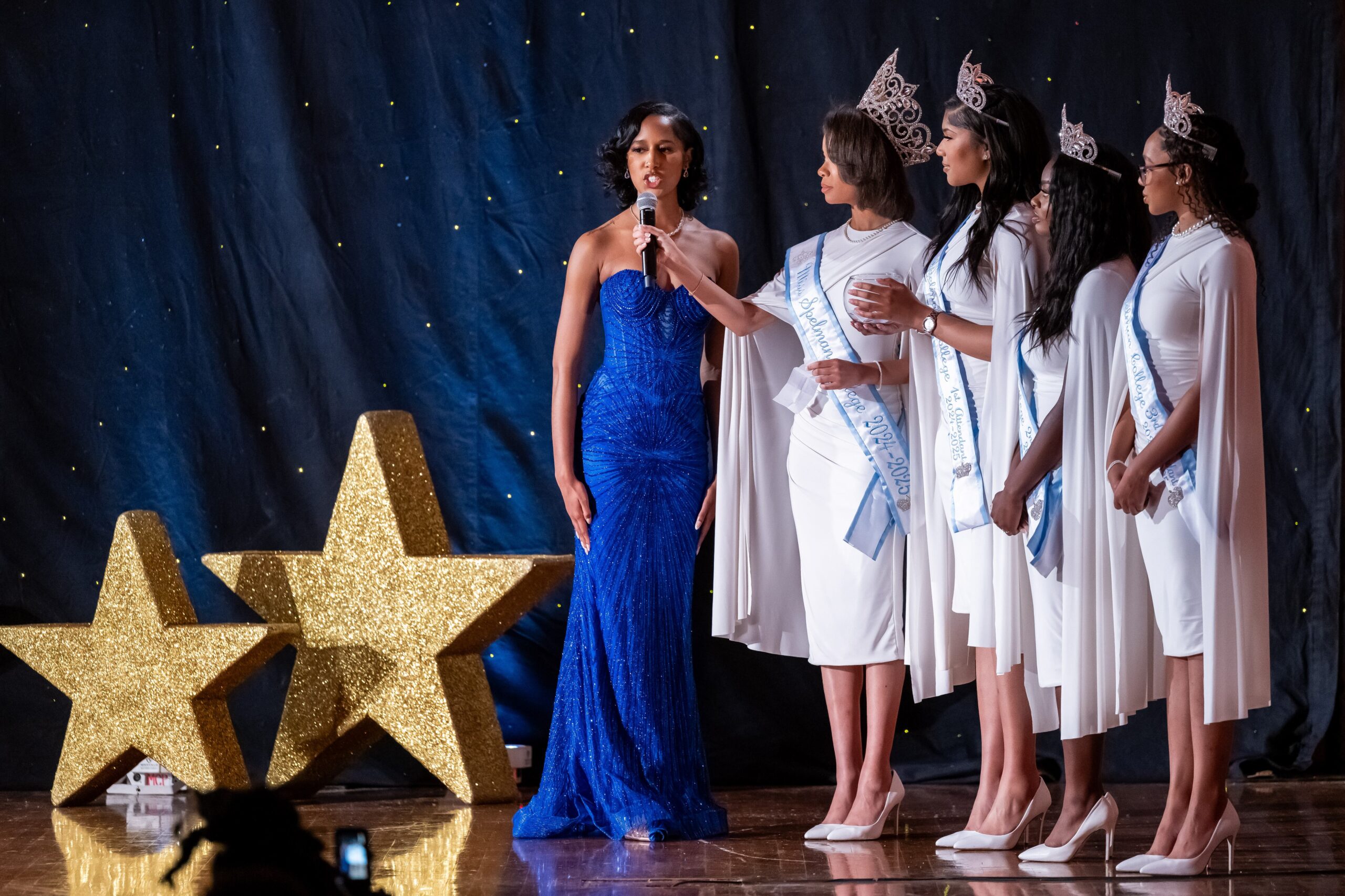School spirit for Spelman College erupted across social media in recent weeks as students prepared for a series of beauty competitions. It culminated with the annual Miss Spelman Pageant, which has cultivated a lasting tradition of bringing students and alumnae together.
On Saturday night, Spelman juniors Taylor Nicole Mills, Camryn Madison Mitchell, Chelsea Tamara Benton, Aziyah Vayioucia Harps, Kayli-Joy Cooper, Madison Nicole Mobley and Tyler Kate Dorsey competed for the Miss Spelman crown.
Loud cheers rose from the packed crowd at Sisters Chapel as the contestants introduced themselves, as if in a debutante cotillion. There were various forms of artistic expression in their performances, including African dance, spoken word, tap-dancing — in sparkly gold shoes — and pirouetting across the stage in various forms of artistic expression.
Ultimately, it was Mills, a theater major whose “Unapologetically Blue” campaign celebrated individuality and championed diversity among Black women, who was crowned the 42nd Miss Spelman. Benton and Harps took first and second attendant, respectively.
Spelman, the all-female historically Black college, hosts the Miss Spelman pageant each spring. Pageant directors assert the competition is not about physical appearances, but more so about showcasing the poise and personality required to represent the community.
According to the school’s website, Miss Spelman and her court serve as ambassadors for the school and are expected to conduct themselves in a manner that reflects positively upon the college.
Before the competition begins, aspiring queens apply and undergo formal interviews with school faculty in January. While faculty members would not disclose their voting criteria, the seven candidates who score the highest during that initial phase move on to compete during the three weeks leading up to the pageant in April.
While training for the competition, contestants hoping to become the official queen of the campus must display individuality, self-assurance and confidence. They find ways to tell personal stories while fine-tuning their mission statements to express why they want to wear the Spelman crown.
On pageant night, contestants perform an opening dance routine, demonstrating their artistic abilities for the audience.
Later, contestants waltz across the stage in elegant gowns before presenting their social platforms.
They also answer questions, asked by the previous Miss Spelman court, in bite-sized interviews concerning such issues as the current social-political landscape.
“A lot of the girls who do the Miss Spelman pageant are not pageant girls,” Miss Spelman Advisory Board Chief of Staff Natalie McDonald said in an interview with UATL.
“They’re people who have just a genuine desire and love for Spelman.”
A few weeks before the pageant, contestants were announced to the public during an event called “The Big Reveal.” In addition to performing a group dance routine, they introduced their campaign platforms, including advocating for Black women to reclaim their personal narratives and encouraging others to prioritize mental health.
Reveal videos of Atlanta University Center students competing in other pageants also went viral recently, including Mr. and Miss Afrolatinidad and the Miss Black and Gold pageant.
Ashley Gabb, executive director of the National Black College Alumni Hall of Fame Foundation, Inc., said pageants at HBCUs teach Black women to embrace their full selves and are less limiting than mainstream pageant systems.
“Campus queens are not symbolic placeholders — they are ambassadors of culture, progress, and advocacy,” Gabb said in a written statement. “At Historically Black Colleges and Universities (HBCUs), queens help cultivate school pride, support student initiatives, and serve as role models for both their peers and the broader community.”
Kelsey Hollis, a current pageant coach and Miss Georgia 2022, agreed that pageants at HBCUs provide empowerment for Black women. She said she regretted not attending an HBCU where she could have had more support from women who would have looked like her.
“It’s not that we’re not capable, but we have to have someone in our corner to understand the position that we’ve been in,” she said.
Within the more popular pageants, Hollis noted that her primary identity was being one of the few Black contestants.
“There’s a formula to the system, in general, in order to win. Then, as Black contestants, we have a formula on top of a formula,” Hollis said. “If you’re not aware of it, it’s going to take you a while to get in the groove of things.”
“Not all pageants are created equal,” said Krystle Saulsberry, a former pageant contestant who has become a pageant judge.
Saulsberry, creator of the pageant consulting firm Krystle Clear Pageantry, said she has guided clients to participate in pageants aligned with their ethics. “Just because it’s a popular pageant doesn’t mean it’s for you,” she said.
Gabb said HBCU pageants defy conformist stereotypes of mainstream beauty pageants. As opposed to competitions that may be solely based on looks, she said HBCU pageant spotlight queens who are leaders on campuses and in their communities.
“Many are first-generation college students who use their platforms to drive fundraising, mental health awareness, voter engagement, and mentorship programs,” Gabb said. “Serving as a queen is a training ground for legacy work. It prepares women for public-facing roles where they must lead with clarity, passion, and excellence.”
Hollis said it’s beneficial for Black women to come together and love on one another in settings like pageants, particularly to counteract high levels of oppression they endure in societies around the world.
“We can learn from each other; we can build each other up. It doesn’t have to be a competition all the time. We’re already competing in this world,” Hollis remarked. “It’s so much more pinnacle when you have a group of Black women together that are able to support each other.”
McDonald agreed.
“At the root of everything is always sisterhood. So, we always encourage the girls to create a bond and a friendship,” McDonald said. “It really makes a difference.”

